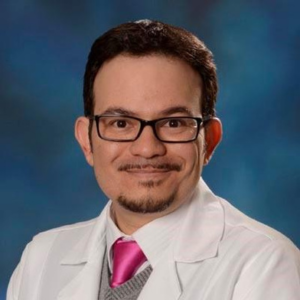A project to develop a way to boost the effectiveness of cellular cancer therapies, led by the University of Colorado Cancer Center’s Associate Director of Cancer Research Training and Education Coordination, Eduardo Davila, PhD, is one of nine research endeavors by CU School of Medicine faculty members to be awarded major funding from the Anschutz Acceleration Initiative.
“We’re beyond excited,” says Davila, a professor in the Division of Medical Oncology of the CU Department of Medicine, about the AAI award, funded largely by The Anschutz Foundation. “It’s such an incredibly strong team effort and we’re just over the moon about it. Being able to impact a patient’s life, and their family and friends, is just beyond words.”
The AAI recipients were announced Jan. 10 by CU School of Medicine Dean John J. Reilly, Jr., MD, during his annual State of the School address.
Offering hope
In his AAI award proposal, Davila says his lab “is developing a novel methodology to enhance all forms of cellular immunotherapy, including a more universal form of cell therapy referred to as tumor-infiltrating lymphocyte (TIL) therapy.”
Cellular immunotherapy “has now risen to one of the most effective and most popular forms of cancer therapy, and for certain tumor types for which no real therapeutic option exists, TIL therapy can offer hope,” he says.
TILs are a type of immune cells (known as T-cells) that penetrate tumors and kill their cells. TIL therapy involves surgically removing tumor tissue from a patient’s body and extracting TILs from the tissue. The cells are multiplied in the lab, then reinfused into the patient’s body to attack tumors.
Or at least that’s what they’re supposed to do, Davila says, but often, “for whatever reason, they’re exhausted, they’re tired. They're just old T-cells that can’t do the job properly. As we age, or as the T-cell is prematurely aged in a tumor environment, it loses all those functions.”
He also says the reinserted TILs have to “travel through the entire body and find the cancer. Sometimes these cells are not very effective at homing back into the tumor,” and sometimes cancer cells try to make themselves invisible to immune cells in various ways.
Live longer, kill better
The technology Devila and his colleagues are developing – focused on a gene called MyD88 that plays a role in programming immune cells – is designed to “rejuvenate” these cancer-fighting cells. “They’ll live longer, kill better, run faster. The genetic modifications that we have invented and developed here overcome their limitations. The immune cells can detect invisible tumors. They can overcome a lot of these signals that would otherwise block their activity. The cells live up to 10 to 20 times longer, and they’re able to home in on the tumors way better than other immune cells.”
As Davila puts it in his AAI project proposal: “The goal is to develop good manufacturing practices, technology and methodology to reduce production times, reduce the number of cells that need to be administered, lessen costs, and generate more effective cellular immunotherapy products. With support from the AAI, the near-term goal is to carry out a first-in-class clinical trial of the TIL technology to be initiated in early 2025.”
Davila says the upcoming trial will focus on head and neck cancers, lung cancer and sarcoma, and include about 20 patients over the next two years or so. “Sarcoma is one of those cancers for which there really doesn’t exist a lot of therapeutic options. So being able to offer a therapy where no therapy exists is a really big deal.”
In theory, Davila says, this form of enhanced TIL therapy is “applicable to treating all types of solid tumors as long as we can extract immune cells from them, modify them, and expand them.”
Funding from the AAI grant combined with support from the Gates Institute on the CU Anschutz Medical Campus will amount to about $10 million to $12 million, he says. “I want to convey our overwhelming appreciation to the Anschutz family and the Gates family. It’s because of their generosity that we will be able to make a tremendous impact.”
The Gates Biomanufacturing Facility adjacent to the CU Anschutz campus is helping with the project, and the Division of Medical Oncology team will design the clinical trial, administer the therapy and care for patients enrolled in the trial.
Photo at top: Eduardo Davila, PhD, works in the lab.




